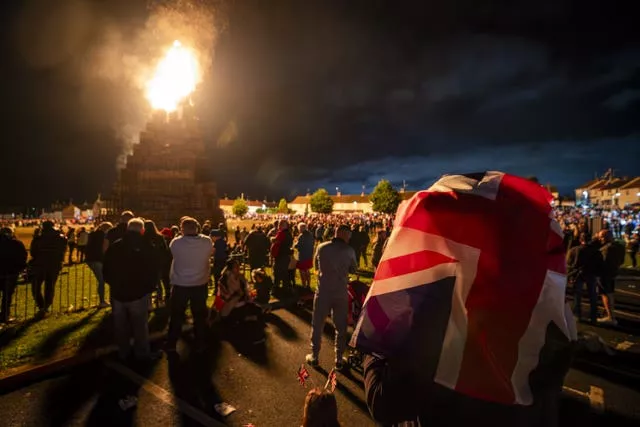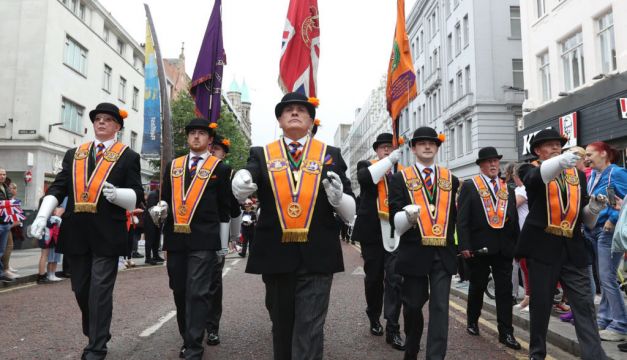Scores of parades will take place across Northern Ireland later as Protestant loyal orders celebrate the Twelfth of July.
The main demonstrations will take place at 18 venues, including Belfast as well as Bangor, Ballymena, Ballinamallard, in Co Fermanagh and Magherafelt in Co Derry.
An estimated half-a-million people are expected to participate or spectate in the annual festival to mark the 333rd anniversary of the Battle of the Boyne.
On Tuesday night, the majority of an estimated 250 bonfires were lit in loyalist communities across the region to usher in the main date in the parading calendar.

A statement from the Northern Ireland Fire & Rescue Service said they received 147 emergency 999 calls between 6pm on Tuesday and 2am on Wednesday – a drop of 28% on last year.
They said 34 of the calls were bonfire-related, one less than last year.
The Police Service of Northern Ireland tweeted one person had been taken to hospital after an incident at a bonfire in the Portaferry Road area of Newtownards.
The placing of an image of Sinn Féin vice president Michelle O’Neill and Irish flags on a bonfire in the Eastvale area of Dungannon, as well as an effigy, above a poster bearing the name of Sinn Féin councillor Taylor McGrann at a bonfire in Rathcoole on the outskirts of Belfast, are being investigated by police as hate crime.

Those actions were condemned by representatives from political parties across the divide.
One of the largest bonfires, located in Craigyhill, Larne, aimed to raise money for a local toddler who is undergoing cancer treatment.
The Battle of the Boyne in 1690, which unfolded at the Boyne river north of Dublin, saw Protestant King William of Orange defeat Catholic King James II to secure a Protestant line of succession to the British Crown.
Thousands of Orange lodge members parade through the summer months to mark William’s victory and other key dates in Protestant/unionist/loyalist culture.

Those celebrations culminate on the Twelfth.
July 13th will see another gathering, this time organised by the Royal Black Preceptory in the village of Scarva, Co Armagh. The event includes a parade as well as a sham fight between actors playing King William and King Charles.
The routes of certain Orange parades became intense friction points during the Troubles, often leading to widespread rioting and violence.
The disputes usually centred on whether or not Orange lodges should be entitled to parade through nationalist areas.

While Orangemen insisted they had the right to parade on public roads following long-established traditional routes, nationalist residents protested at what they characterised as displays of sectarian triumphalism passing through their neighbourhoods.
The number of flashpoints has reduced significantly in the peace process years.
DUP Leader Jeffrey Donaldson has encouraged peaceful and positive July 12th celebrations.
“Celebrations over the 11th and 12th are part of the cultural fabric of Northern Ireland and for the vast majority of us they are an occasion where families will come together, often travelling home from wherever they now live to enjoy the occasion together,” he said.
“I am proud of my culture and my tradition, but I recognise that there are different cultures and traditions within Northern Ireland. For those of us who do cherish the legacy of the Glorious Revolution then the best way to show that to others is through peaceful and positive celebrations.
“Those don’t include the burning of flags or election posters on a bonfire, but thankfully in the vast majority of cases that does not happen. Unfortunately, it will be a minority of cases where offence is caused that will dominate the headlines. As unionists we need to recognise that such incidents are self-inflicted wounds.”







